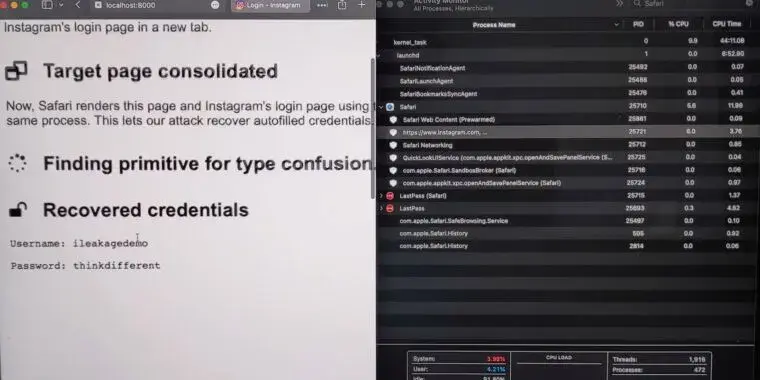So f’ing mad at Apple for forcing Firefox to use Apple’s WebKit on mobile instead of Gecko.
A monopolist corporation standing in the way of security sounds like Microsoft forcing everyone to use IE, but worse because of the walled garden that is iOS.
True but it might be one of the few reasons websites are even optimised for something else than chrome these days.
The difference is: Microsoft never forced, they just nudged users very aggressively. They got into trouble for that multiple times and needed to adjust their practices (but keep trying). For some reason, nothing ever happened to Apple (yet). In my opinion, tech media is way too lenient on this as well.
This is not just bad because of privacy, Safari has been slowing down progress on many web apis for years. Other browser implementations would also probably be faster and/or drain less battery. I could probably come up with even more reasons.
Gecko has its own problems. Installing Gecko would fix that webkit security breach for sure, but you would end up with gecko’s security breach. So in the end it doesn’t change anything.
Actually it does, because you have options if a 0-day surfaces. Your logic only works if there happen to be multiple 0-days released at the same time on all major browsers which affect all recent versions for each browser (because on iOS, you can’t even downgrade to a previous version that could be unaffected). That will probably never happen.
0-days that we know of
There definitely are 0-days in every major browser engines.
As a matter of fact, Mozilla is probably working on a 0-day breach that haven’t been published by security watchdogs yet.
In the meantime, that particular WebKit breach has already been patched.
There’s no point skipping places when everything is on fire. The only thing you can do is going where it’s safer on average and stay there.
Of course there are unreleased 0-days, but you can’t do anything about it. Most of them are even kept secret by companies that sell spy software. However, public 0-days are way more dangerous because they are being exploited actively.
Using a different browser until a particular issue is fixed when you are e.g. a journalist still helps with getting hacked.
Of course there are unreleased 0-days, but you can’t do anything about it.
And that’s exactly my point.
Using a different browser until a particular issue is fixed when you are e.g. a journalist still helps with getting hacked.
Actually no. Because you never know what currently unfixed 0-day is actively exploited in any browser. Using Gecko or Chromium today because Webkit had a security flaw yesterday doesn’t make anything safer. It might comfort you, but that’s it.
The only important metric is the number of 0-day discovered per year per engine. It’s a matter of probability.
Changing engine would be like changing dice because you had a bad number, without knowing how many side you’ll get with the new ones.
Ah, now I got what you meant. I was just suggesting switching temporarily while the published 0-day would be public and unpatched, because this is the time in which the issue would be exploited the most.
I never understood the sentiment of many Apple fans around me who bark “Apple products can’t be hacked or infected with viruses!”
Nonetheless, I hope that a security patch will soon be available for those affected.
Do people still say this? This seems like one of those tired things that gets passed around the Internet in the name of “Boo Apple!”
I don’t think I’ve heard any Apple products users of any tech background (or none at all) say since the early 2010s. Yet non-users keep parroting it.
You might be right. The last time I heard that, was probably almost a decade ago. It’s just something that got stuck in my brain about Apple superfans
It has been patched in Safari Technology Preview 173. We are currently running 181.
Apple released security patches for iOS 15 and iOS 16 yesterday besides iOS 17.1
I’m pretty sure it has been solved already.
🤖 I’m a bot that provides automatic summaries for articles:
Click here to see the summary
Researchers have devised an attack that forces Apple’s Safari browser to divulge passwords, Gmail message content, and other secrets by exploiting a side channel vulnerability in the A- and M-series CPUs running modern iOS and macOS devices.
The researchers have successfully leveraged iLeakage to recover YouTube viewing history, the content of a Gmail inbox—when a target is logged in—and a password as it’s being autofilled by a credential manager.
Once visited, the iLeakage site requires about five minutes to profile the target machine and, on average, roughly another 30 seconds to extract a 512-bit secret, such as a 64-character string.
“In particular, we demonstrate how Safari allows a malicious webpage to recover secrets from popular high-value targets, such as Gmail inbox content.
Finally, we demonstrate the recovery of passwords, in case these are autofilled by credential managers.”
The design of A-series and M-series silicon—the first generation of Apple-designed CPUs for iOS and macOS devices respectively—is the other.
Saved 52% of original text.
Don’t worry, you just need to buy the next iPhone and Mac ;) – Tim Cook, maybe
/s
Just buy your mum an iPhone. Problem solved. /s
And another for my grandma
That must be why iOS 15 and iOS 16 have been patched last night. /s
A patch isn’t (yet) available.
But a workaround is. Configure your password manager (or switch to another password manager) so it doesn’t automatically fill usernames and passwords as soon as you open a webpage. Set it to fill the credentials when you click a button or hit a hotkey.
And after this security flaw is fixed? Leave the settings like that. Because this isn’t the first time autofil has resulted in a major compromise and it won’t be the last time either.
PS: this speculative execution bug was reported to Apple a very long time ago and there are experimental settings you can change to test the fix… but they might be buggy. Modifying your password manager’s behaviour will not be buggy. The setting is:
defaults write com.apple.safari InternalDebugProcessSwapOnCrossSiteWindowOpenEnabled 1Oh what a let down. I’m disabling autofill now until it’s fixed.
deleted by creator









